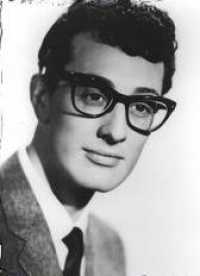It’s hard to believe, but at the time of Buddy Holly’s death at the age of twenty-two he had only been recording for two years. Yet during the course of his short career he had written and performed the most progressive music of his time. Laying the musical foundation for musicians generations too come.
Buddy (a childhood nickname) was born Charles Hardin Holley in Lubbock Texas on September 7th, 1936. The “e” in Holly’s name was dropped due to a spelling error on his first recording contract. Excited, and not wanting to jeopardize his contract, he simply signed his name as Buddy Holly.
Buddy performed during his teen years with close friend Bob Montgomery. Billing themselves as Buddy and Bob they performed local events throughout Lubbock, Texas. It was after opening a show for Elvis Presley at a local gig in 1955 that Buddy knew exactly what he wanted to do.
Success didn’t come until Holly formed his new group, the Crickets, which consisted of Jerry Allison on drums, Niki Sullivan on guitar and Joe Maudlin on Bass. The Crickets recorded “That’ll Be The Day” in the Clovis, New Mexico studios of producer Norman Petty. The record hit the top of the charts in September of 1957.
The group continued their success with songs such as “Oh Boy” and “Peggy Sue.” Buddy, however, was growing restless, and in the fall of 1958 he split with the Crickets and Norman Petty. He married Maria Santiago and relocated to Greenwich Village in New York City. In October of that same year Holly recorded “True Love Ways and “It doesn’t matter anymore.” The songs were powerful and filled with promise. Sadly, Buddy would never realize their potential.
In January of 1959, Buddy, along with Ritchie Valens, the Big Bopper and other acts embarked on what was billed as the winter dance party. Holly, Valens, the Bopper and their pilot perished en route to a performance when their four-seat chartered plane crashed shortly after take off from Mason City Iowa on February 3rd. It was a terrible tragedy, as Don Mclean hauntingly put it in his 1971 hit “ The day the music died.”
Buddy may have died in that plane crash, but his music most certainly did not die. His influence can be felt in all forms of popular music today. Still, one can’t help but wonder what changes might have occurred in music if Buddy hadn’t chartered a plane on that fateful day. Sadly, We will never know.
Source: http://www.allsands.com/Music/Bio/buddyhollybio_xjy_gn.htm
